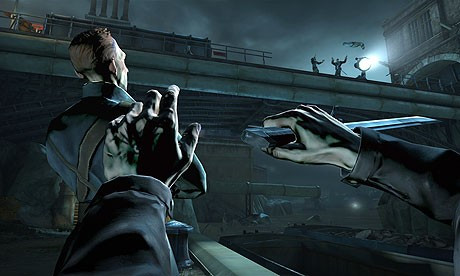Why Games Matter: Dishonored is Pointless
A blog dedicated to big issues affecting the games industry
Dishonored is Pointless - How hiding the stats and mechanics in Dishonored makes the game much better
I wrote in The Escapist a while back that morality gauges, XP metres and good/bad endings ruin games by constantly making you aware of the wrong and right ways to do things. If you're playing Deus Ex, say, and you see the notification that says "GHOST +100 XP" then you know that it's more rewarding to play the game without being seen.
Same goes for Fallout, when you steal a plate and get the "You've Lost Karma" warning. Even though you wanted to steal the plate you're probably not going to do it again because if you have Good Karma you get a nicer ending. This kind of arbitrary score keeping kills-choice-based games, conditioning players like Pavlov to sit and roll over so they can get a treat.
But the extra side missions/more XP you get from sparing characters and being sneaky are paltry rewards compared to the fun of playing a game your own way. Dishonored knows this, and it's happy to let you express yourself.
It gives you a frowny-face on the mission over screen if you kill too many people, and there's a good and a bad ending, but for the most part, Dishonored doesn't nag, allowing you the space to play as you want without making you feel like you're doing something wrong.
A speck on the carpet
For someone like me, who can't relax in a room if there's even a speck of fluff in the carpet, it's very liberating. I like order, and neatness; whenever Deus Ex warns me that a body's been found or an alarm's gone off, it feels like a speck on my carpet. I have to reload and try again so I can get the stain out.

Dishonored doesn't make me feel like that. It dumps the scorekeeping and status updates for a more organic experience, letting you decide for yourself whether you want to reload or not. Typical stealth games never do that; genre staples like Hitman and Splinter Cell all but force a retry should you get spotted, turning every enemy in the level against you at once and scaring you off with flashing alert screens and loud music.
Dishonored is a lot more forgiving - rewarding, even - when you get seen by the guards, turning what is usually a game over scenario into a fun, self-contained action flourish as you dispatch the guy that caught you, and possibly three of his friends.
Once they're down, and their bodies are hidden, things go back to normal; if you're quick and quiet enough about it, it won't even affect the Chaos level, Dishonored's version of Fallout's Karma.
It makes for a much more interesting game, where actions still have consequences, but not the same consequences every time. Being seen is a greyer affair, which opens the game up rather than shutting it down. Dishonored ebbs and flows, gracefully treading between action and sneaking without ever lopsiding into either. Stat fiends can still load up every time they get made, and action buffs can charge in if they like.
A personal touch
Personally, I took the "abusive but elusive" approach, always opting for stealth first but never backing down from a fight if one broke out. Eventually that encompassed a fully-fledged imagined narrative of my own making: I became a ruthless pragmatist, ignoring Runes, coin and side quests to find the quickest and most effective way to kill my target, and his officers.

The officers thing was my personal touch; in keeping with my character's ambitions to destabilise the local government, I took to purposefully hunting down any ranking members of the militia, therefore in my mind creating disquiet in the rank and file, who'd refuse to be good soldiers out of fear of being promoted.
And the game never punished me for it. Even with a relatively low amount of magical power (collecting Runes lets you teleport, stop time, turn into a rat and other things) I was able to play Dishonored just the way I liked it, flourishes and all.
Try that with other games, and you'd struggle to get past the first third; you have to listen to Deus Ex when it tells you not to get seen, otherwise you won't have enough points to upgrade your guns and win the boss fights.
But like its Victorian London backdrop, Dishonored is an enormous grey area. It's eschews typically mathematical stealth mechanics for a colourful sneak-action experience, never punishing you for playing one way or the other. It's not a big or particularly long game, but thanks to the absence of tutting error messages, it has just as much scope of any of Bethesda's larger games.
Not interested in points
A complete anal retentive, I was dreading Dishonored. I expected to have to spend hours trying to get round tricky guard patrols, circling the same level looking for the last bit of hidden loot just so I could stop my eyebrow twitching.
Instead, I got to be myself for a change. I got to play a game how I wanted to play it, instead of how I thought I should be. If someone struck me as evil, I killed them and didn't worry about the extra quest they might have offered later. If the guards caught me, I killed them too. Sod the points - the end of mission stat round up just gave me something to gleefully ignore.
I've been taught my whole gaming life to chase hidden areas, longer gameplay and high-scores. Dishonored isn't interested in points. It's shown me there's much more to games.
© Copyright IBTimes 2025. All rights reserved.






















